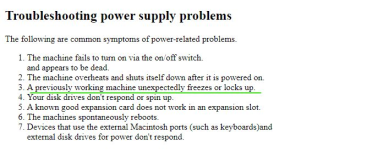Hi,
i have an se/30 that have been working beautifully for quite many years. Its equipped with a scsi2sd and i also have the Rominator II from BMOW.
2 years ago, i had the "simasi" pattern on the screen and so i ordered the recap-kit and replace all of them. After this, it worked 100% again, until yesterday. Now when i power on, i get the chime and i see the mouse-pointer on the screen. I can move the mouse for ~5 seconds before everything freezes. Restarting the machine only repeats the above.
I wonder if this behaviour could be caused by non-connectivity of the ROM? I get no errors or such.
i have an se/30 that have been working beautifully for quite many years. Its equipped with a scsi2sd and i also have the Rominator II from BMOW.
2 years ago, i had the "simasi" pattern on the screen and so i ordered the recap-kit and replace all of them. After this, it worked 100% again, until yesterday. Now when i power on, i get the chime and i see the mouse-pointer on the screen. I can move the mouse for ~5 seconds before everything freezes. Restarting the machine only repeats the above.
I wonder if this behaviour could be caused by non-connectivity of the ROM? I get no errors or such.

